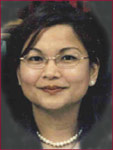

When Joanna Ocampo-Flores immigrated to Winnipeg in 2004, she soon discovered that her educational background and eight years of working in preschools in the Philippines did not qualify her to work in child care here.
“I sent my credentials to different certification bodies,” says Ocampo-Flores. “They all said my six years of university education [a psychology degree and courses towards a graduate degree in education] meant nothing here.”
Ocampo-Flores might have given up had she not been asked to participate in a Manitoba Child Care Program pilot project—ECE: Internationally Educated Qualifications Pilot Project—for immigrant educators. Participants could gain certification as Level 2 early childhood educators using the credentials and experience acquired in their homelands if they were positively assessed after 14 weeks of paid on-the-job training. A peer assessor and an advisor assessor worked with them during the 14 weeks.
Ocampo-Flores jumped at the chance to be part of the pilot, and now works with children aged two to five at Aleph-Bet Child Life Enrichment Program. Her dual-nation experience has provided valuable insights into some of the differences between working in child care in Canada and the Philippines.
For example, unlike in the Philippines, children here call her by her first name—“they have the right to be heard.”
Another difference is the opportunity to work with children with special needs. In the Philippines, “the government can’t provide even the most basic needs of the population.”
Other differences concern the job duties and the way early childhood educators are regarded. In the Philippines, ECEs do not have housekeeping duties as well as their educational duties. They are also given the same respect as teachers in schools. “We make sure we provide children with developmentally appropriate activities and experiences and that takes a lot of training, research and planning.”
Ocampo-Flores loves the rewards and challenges of her chosen career. “The best part is that I go to work every day not questioning why I’m doing this. No matter how hard your day is, there’s bound to be one thing that will make you smile.”
Newsletter Signup
Follow Us